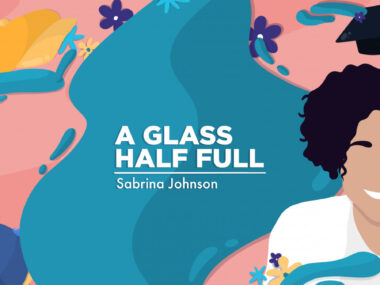Being ‘othered’ is an invisible burden we unfortunately must face
People sometimes say insensitive things about my nonverbal son
Written by |

Most days, I’m met with kindness and warmth when I’m out with my 2-year-old son, Jude, who lives with Angelman syndrome.
Neighbors see us helping Jude with his gait trainer and kneel down to his level to smile and encourage him. Friends and family show genuine interest in learning about Jude’s augmentative and alternative communication (AAC) device, as he’s nonverbal. They’ll say hello to him on his device. Parents and children in Jude’s swimming class patiently wait while we take longer to exit the pool, since he isn’t yet standing or walking.
Unfortunately, though, it’s the rare and jarring experiences that stay with me. The strangers who talk about Jude in front of him as if he can’t understand.
Some of the comments I’ve heard include, “Companion cards are usually for people who are much older,” and, “Prams [strollers] aren’t disability equipment.”
These words ignore the fact that disabilities affect people of all ages and aren’t one-size-fits-all. They disregard the notion that while Jude can’t speak, he’s still capable of listening and understanding what is being said about him.
Then there are the encounters that involve no words at all: the double takes when I help Jude out of the car after having parked in an accessible parking spot; the stares when I model AAC to Jude in public. The message is clear: “You don’t look like you belong here.”
Then there are the dismissive reassurances: “He doesn’t look like he has a disability.” Or, “He seems fine to me.”
Although it’s said with a smile and is perhaps well-meaning, it invalidates the invisible challenges that we navigate every day, such as trying to figure out why Jude might be crying because he can’t communicate, or needing to keep an eye on him at all times while he chews on nonfood objects. It implies that he isn’t “disabled enough.”
During these moments, I’m suddenly forced into the role of educator, advocate, and defender. But leaving home is already an effort to begin with, and sometimes I don’t have the energy to explain (again) what makes Jude different. It almost always happens at the worst time, such as when I’m rushing him to therapy or a doctor’s appointment.
All of this reminds us that our lives are different. I carry a heavy weight knowing that my young child, who is so full of joy and love, may be “othered” his entire life.
If you’ve felt that ache, that flash of anger or sadness after an ignorant comment, I don’t think you’re overreacting. You’re not “just sensitive.” Nor are you alone. You see your loved one who is living with Angelman syndrome for who they are and care deeply about their dignity and inclusion.
Disability awareness has come a long way these days, but certainly not far enough. Until it does, I’ll keep advocating for Jude and others like him, because while he might be unable to speak, his voice matters.
Note: Angelman Syndrome News is strictly a news and information website about the disease. It does not provide medical advice, diagnosis, or treatment. This content is not intended to be a substitute for professional medical advice, diagnosis, or treatment. Always seek the advice of your physician or other qualified health provider with any questions you may have regarding a medical condition. Never disregard professional medical advice or delay in seeking it because of something you have read on this website. The opinions expressed in this column are not those of Angelman Syndrome News or its parent company, Bionews, and are intended to spark discussion about issues pertaining to Angelman syndrome.






Lilly
Thank you for being such a joy and a positive human being.
Understanding and being a positive influence on parents,grandparents who are living thru the harsh, mean realties of how awful some people are.
It saddens me tremendously to feel the pain and heartache that other humans inflict up on innocent Angels and the hard work that every parent goes thru on a daily basis.
Thank you for being a true inspiration to those of us that see what it's like to watch out loved ones be
Labeled as the " Other", the one who is not even thought of when there are get together, birthday parties, BBQ 's so on and so forth.
My hope is that one day before my eyes close that I will see a change in this world where children with this rare syndrome will be treated just as humane as the typical child and that people become educated around what the life of an Angel man's
Child and family consists of.
Understanding, inclusion and pure caring costs nothing financially.....it's free, it's what everyone possesses naturally.
Have a heart and make a child, adult, parent, grandparent smile.
Life is hard make it simple be grateful that you can see, hear, speak,walk and much more.
BE KIND PEOPLE LIFE IS UNPREDICTABLE ....
AND SHORT....LIVE & LET LIVE.
AMEN!!!!
Pam Holdway
Hi. After reading your heartfelt article I am truly saddened by how people behave. They truly do not understand what Angelman's is all about. I didn't know what it was! I am the grandparent of a beautiful Angelman granddaughter. She is perfect in every way to me! Her parents carry the same burden you do. I watch the love and care going on 24 hours a day. But it is a lot of work. She is so incredibly smart, sweet and active!!! And you are so right. You can't leave them alone because they seem to eat everything they shouldn't!! But the joy I feel when I am with her is so contagious and full.
She senses when things are not right, so I always try and leave my worries behind. Don't let other people, who don't really matter anyway, bring you down. That light of your life, Jude, is all that matters.
It seems to me that the Angelman community is growing. People are becoming more aware. And so I hope, in the not to distant future, you won't have to try and defend or validate Jude. He is just another wonderful human being that loves and is loved.
My very best to you and your family!